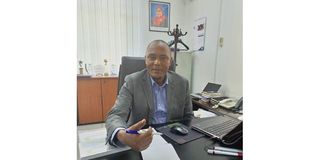Why universal health insurance needs to be regulated effectively

What you need to know:
- Insurance chief says effective regulation of UHI will boost health service delivery and the economy
With Parliament expected to debate and possibly endorse the Universal Health Insurance (UHI) Bill, 2022 this week, the Commissioner of Insurance at the Tanzania Insurance Regulatory Authority (Tira), Dr Baghayo Saqware, details in this exclusive interview with The Citizen News Editor Samuel Kamndaya the authority’s preparedness in regulating the arrangement, and why UHI is a game changer in the history of Tanzania’s health service delivery and the economy as a whole. Excerpts:
Q. In a nutshell, what kind of Tanzania should we expect under the UHI that is effectively regulated?
A. We should expect a country where the delivery of health services and the economy will have been completely transformed. An effectively regulated UHI system will create a situation whereby insurance companies will accumulate funds through UHI premiums. These funds will be kept in commercial banks. When banks have enough liquidity, people will get loans at affordable interest rates. Its multiplier effect can be easily seen.
With the Bill introducing Tira as the overall regulator of insurance schemes, how prepared is your institution to take on that mandate?
First of all, it should be noted that the genesis of UHI is the need to improve the delivery of health services among Tanzanians. It is a Constitutional provision that compels the government to ensure that all Tanzanians have access to quality health care. To achieve that, you basically need four things: physical infrastructure in terms of hospital buildings, diagnostic equipment, health experts and financing. If you make a critical analysis of the four, you will realize that we have the buildings, we have the equipment and we also have experts. However, financing has always been a challenge. During the early days of our country’s independence, the government could completely take care of the financing part but later, it was realized that the exercise was draining public resources. We shifted to cost-sharing which is also expensive. We then decided that health insurance must be mandatory for all civil servants and that was why the National Health Insurance Fund (NHIF) was established. However, that was also leaving a good part of the population who work in the informal sector. We had to do something.
At one point, it was being said that NHIF was not doing well financially, being an expert in that field, why was that so and what should be expected with the UHI?
The problem is in how we live as Tanzanians. A good number of us tend to seek health insurance cover when they fall sick. It doesn’t have to be that way. It is when a family member falls sick that you see relatives calling each other and making contributions so they can buy a health insurance policy for their sick colleague. This is contrary to how the insurance sector operates. An insurance company must have funds well in advance before the client makes a claim. You have to insure your car so you can claim for refunds from an insurance company in case of an accident. That said however, the UHI decision has nothing to do with what has been happening in NHIF.
Of the provisions in the UHI Bill, which ones would easily define its key objective?
Basically, the UHI makes it compulsory for citizens to have health insurance covers and that is so because the health of Tanzanians is a constitutional issue for the government. We also decided that we should have a standard package. It also appeared good that the sector must be regulated and finally, that if we are to effectively make it compulsory then it has to be tied to other services. That was precisely why it was proposed, for instance, that if one wants to go to college or wants to apply for a driving license or a motor vehicle insurance, then that person must also produce a health insurance card.
Among the issues raised by some legislators during the debate on the bill was that instead of giving the regulatory mandate to Tira, a new body could have been formed to undertake the UHI regulatory role. What do you have to say on that?
In short, there has been a lot of misunderstanding regarding that particular aspect. Tira is going to regulate insurance services and not health services. Our duty will be that of outlining the standards that must be followed by hospitals that offer services on an insurance arrangement. Currently, the situation is that if a customer for NHIF is aggrieved by the service he has received, he goes to NHIF for complaints. The regulatory goal is to protect the interests of both the insurance provider and the client. It should be noted that insurance companies do not operate with their own money. They operate with money that belong to individuals who contribute through their insurance premiums. As such, the way the insurance company makes use of it must be regulated. If for instance the NHIF wants to invest in a real estate project, the regulator has to come in and issue principles on how money meant for members’ health must be invested.
In short therefore, how prepared is Tira to take on the mandate?
Tira has been in existence for 26 years now since the days when it operated as a department in the Ministry of Finance. As such, it has enough experience and expertise to undertake the assignment. Secondly, it already has several guidelines to guide the conduct of insurance activities in the country. Thirdly, Tira has an organizational structure that makes it ideal for such a mandate. It has a board of directors whose chairman is a Presidential appointee while the members are appointed by the Minister for Finance. There is an Insurance Ombudsman and an Insurance Appeals Tribunal. You have the Insurance Commissioner and his team of experts. All these are there to foster the checks and balances in the conduct of the insurance business. For instance, if a customer is unhappy with the service given to him by an insurance company, he sends his complaints to the company. If dissatisfied, he sends the complaints to Tira and then to the Ombudsman and finally, to the High Court. This was formed in an effort to protect people’s interests and for the sustainability of the market. As part of preparations for our role under the UHI, we are now setting up a special department within Tira that will regulate UHI. Its mandate will be that of looking at health insurance and hospitals among others. We have enough experts here. The fourth aspect that gives me hope of a smooth ride is that we already have the systems in place like the Tira MIS [a portal that manages motor insurance stickers and their respective cover notes]. We have a risk-based supervision system which allows us to see the risks in any insurance firm and issue an alert. We have the right people who are well trained and qualified.
What is the best practice elsewhere?
When we say there is no reason for thinking about establishing a new body to regulate UHI, we are saying so in understanding that the world over, insurance, social security and actuarial science are actually related courses. In fact, experts in these fields study similar programmes during early days of their studies until at such a point when they choose to specialize. That is why in Namibia, all financial institutions that do not fall directly within the regulatory mechanism of the Central Bank are managed by a single institution known as the Namibia Financial Institutions Supervisory Authority (Namfisa). In Zambia, both insurance and pension funds are regulated by a regulatory body that is known as Pensions and Insurance Authority (PIA) while in Botswana, they have something similar to that of Namibia. In short, social protection and insurance is one thing and therefore, separating them only serves to increase operational costs for no apparent reason. The principles are universal and that is why Tira is a member of regional regulatory bodies for insurance and non-bank financial services in Africa, East African Community and Southern African Development Community. Tira regulates a number of multinational companies like Jubilee and Sanlam among others and this gives us a chance to share experiences with our counterparts where the companies also operate.
It is said that the NHIF is too big to be regulated by Tira?
Such views are based on a lack of understanding of what insurance entails. Regulating would give NHIF a chance to do re-insurance. Reinsurance is a contract between a reinsurer and an insurer whereby the insurance company transfers risk to the reinsurance company, and the latter assumes all or part of one or more insurance policies issued. In this case, no company can be so huge that there can no longer be a way to insure it.



